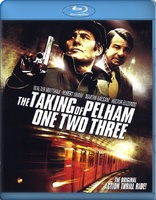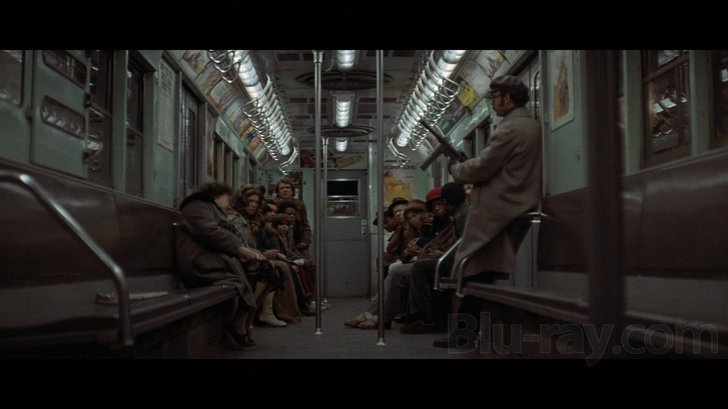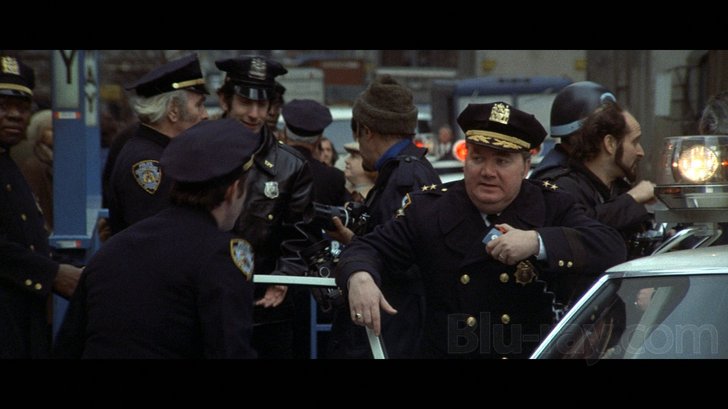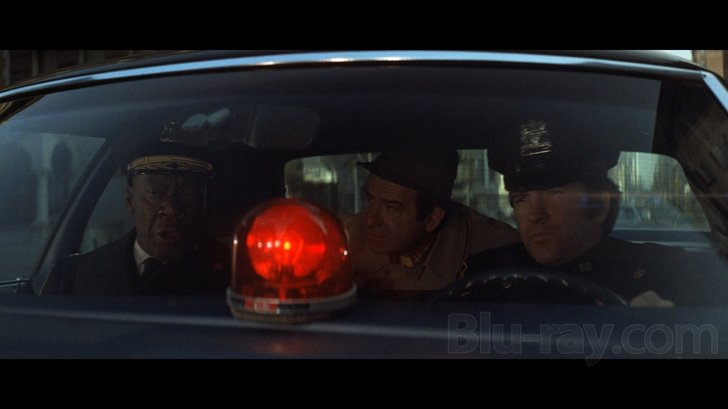The Taking of Pelham One Two Three Blu-ray Movie
HomeThe Taking of Pelham One Two Three Blu-ray Movie 
Metro-Goldwyn-Mayer | 1974 | 104 min | Rated R | May 29, 2011
Movie rating
7.9 | / 10 |
Blu-ray rating
| Users | 4.1 | |
| Reviewer | 3.5 | |
| Overall | 3.5 |
Overview
The Taking of Pelham One Two Three (1974)
A gang of thugs who have hijacked a subway train near New York's Pelham Station threaten to kill one hostage per minute. Forced to stall the assailants until a ransom is delivered or a rescue made, transit chief Lt. Garber must somehow ad-lib, con and outmaneuver one of the craftiest, cruelest villains ever.
Starring: Walter Matthau, Robert Shaw (I), Martin Balsam, Hector Elizondo, Tony Roberts (I)Director: Joseph Sargent
| Drama | 100% |
| Heist | 44% |
| Thriller | Insignificant |
| Crime | Insignificant |
Specifications
Video
Video codec: MPEG-4 AVC
Video resolution: 1080p
Aspect ratio: 2.35:1
Original aspect ratio: 2.39:1
Audio
English: DTS-HD Master Audio 2.0 Mono (48kHz, 24-bit)
Spanish: Dolby Digital 2.0 Mono (192 kbps)
French: Dolby Digital 2.0 Mono (192 kbps)
Subtitles
English SDH, French
Discs
50GB Blu-ray Disc
Single disc (1 BD)
Playback
Region free
Review
Rating summary
| Movie | 4.0 | |
| Video | 4.0 | |
| Audio | 2.5 | |
| Extras | 0.5 | |
| Overall | 3.5 |
The Taking of Pelham One Two Three Blu-ray Movie Review
"Gesundheit!"
Reviewed by Michael Reuben June 7, 2011The Taking of Pelham One Two Three is 37 years old and looks it, but there's nothing antique about its craftsmanship. The storyline is simplicity itself: Put armed men in charge of a subway car of hostages, and watch while layers of city bureaucracy try to respond, on a deadline, to their ransom demands. Little time was wasted on backstory, subplots or exploration of motive. The effect becomes obvious when one compares the 2009 Tony Scott-directed remake, where substantial screen time is devoted to such concerns, and the movie goes slack as a result. The 1974 original may not have Scott's whizz-bang camera moves or the saturated palette he's come to favor, but it's much more engrossing. Thrillers work best when they're pared to their essence.

Not the usual day for Lt. Garber.
On an ordinary day in Seventies Manhattan (which, at that time, was an urban eyesore on the brink of bankruptcy), four men enter the IRT subway at different stations. They're identically attired in checked overcoats and hats, and they all sport glasses and moustaches. With few words and precision timing, they seize control of a No. 6 train designated as "Pelham One Two Three", because of its point and time of departure (Pelham Bay Park at 1:23 p.m.). In a device to which Quentin Tarantino will later pay homage in Reservoir Dogs, the men use colors instead of names: Mr. Green (Martin Balsam); Mr. Grey (Hector Elizondo); Mr. Brown (Earl Hindman); and the leader, a coldly efficient Englishman known as Mr. Blue (Robert Shaw, just one year after playing crime boss Lonnegan in The Sting and one year before creating Quint in Jaws).
At MTA headquarters, Zach Garber (Walter Matthau), a lieutenant in the Transit Authority police department, is shepherding a group of Japanese dignitaries on a tour of the facilities when the call comes in. A subway train has been taken, and the men holding it want money, or they'll start killing passengers. At first no one can believe it. Even today, the notion of holding a subway train for ransom seems far-fetched. There are only so many ways to escape from an underground tunnel. But Mr. Blue gives the city authorities such a short deadline - one hour - to assemble a million dollars in cash that they barely have time to think up a counter-strategy. (Historical note: A million dollars may not sound like much, but that was a different era. Subway fare has risen by 650% since then, and it's still not enough to run the system in the black.)
The remainder of the film alternates between tense scenes of waiting below ground and frenetic scenes of activity above. Various groups in the city have to coordinate their response, and they don't always work well together. On the front line are the TA police, personified by Lt. Garber and his chief assistant, Lt. Rico Patrone (Jerry Stiller). Then there are the regular city cops, led by Inspector Daniels (Julius Harris) and a local borough commander on the scene (reliable character actor Kenneth McMillan). The MTA's operational personnel are tearing their hair out trying to manage the world's largest transit system as it grinds to halt around a single train stopped in a tunnel, and they're none too pleased. Managers like Correll (Dick O'Neill) would just as soon see a S.W.A.T. team storm Pelham One Two Three and shoot it out with the hostage takers, no matter what the collateral damage. Others, like Caz Dolowicz (Tom Pedi), are simply outraged at the invasion of their turf.
Finally, of course, there's the mayor's office. Since the ransom is being paid from city coffers, the political class must have its say. In the original version of Pelham One Two Three, the mayor is portrayed as a spineless whiner, whose decisions are made for him by his chief aide (the ever dapper Tony Roberts) and his wife (Doris Roberts, with the unmistakable voice that would later echo through Everybody Loves Raymond). An interesting note: The actor who portrays the mayor is Lee Wallace. Thirteen years later, Wallace would play the mayor of Gotham City in Tim Burton's Batman, and New York audiences routinely laughed when he appeared on screen because of his resemblance to then-Mayor Ed Koch. No one seemed to remember that Wallace had played the part long before Koch was elected. In this instance, life did imitate art.
Both the hostage-takers' plan and the film's ultimate resolution are less complicated in this version than the 2009 remake, and that's all for the better. Like Mr. Blue, the director, Joseph Sargent, doesn't leave the viewer excess time to get distracted or start considering alternate possibilities. Garber is our hero, but he's neither exceptional nor a man trying to make up for past mistakes. He's a cop with a job to do, and he's good at it. Walter Matthau is remembered primarily as a comic actor because of his legendary partnership with Jack Lemmon, but the same "working stiff" quality that made him perfect for Oscar Madison also make him convincing as an unflappable New York TA police lieutenant. And being Brooklyn born, Matthau fit right in.
Director Sargent perfected his craft filming episodic TV on shows like Gunsmoke, The Man from U.N.C.L.E. and The Fugitive, and it shows in the directness and efficiency of the storytelling. At the same time, you can almost feel Sargent enjoying the spaciousness of the wide Panavision frame, especially in locations like the MTA control room, where he frequently has people arrayed across the screen, showing not telling the scale of the crisis. The characters may be using antique technology, but directorial know-how that ekes tension out of scenes of people talking into microphones never goes out of style.
The Taking of Pelham One Two Three Blu-ray Movie, Video Quality 

Evaluating the Blu-ray presentation of Pelham One Two Three presents a challenge, because
most of us haven't seen the film except in sub-par home video versions. (The region 1 DVD
wasn't enhanced for 16:9.) Even those of us who saw the film in theaters can't rely on memories
of a viewing over three decades ago.
Viewers who are allergic to anything grainy on Blu-ray won't like this disc. Those who
appreciate efforts by colorists and compressionists to preserve the vintage look of the era in
which a film was made should be delighted. The inherent softness and grain structure of the
image appear to be undisturbed throughout the film, and no apparent effort has been made either
to reduce the grain or sharpen the image. This is a Seventies film, and it looks like one.
Where the transfer is more likely to generate controversy, even among those who don't object to
grain, is its darkness. This transfer of Pelham One Two Three is considerably darker than
previous versions, although never so much so that one cannot see what is going on. Black levels
are sufficiently strong, and detail is sufficiently well maintained, that one can always make out
what's happening, even in the long stretches in the subway tunnels with scant illumination. In the
absence of an answer print or any input from an authoritative source such as the director or the
cinematographer (the distinguished Owen Roizman, whose credits include The French
Connection), it is impossible to say whether this darker version is more accurate than previous
renditions. I can only note that scenes set in full daylight or brightly lit interiors appear to have
adequate white levels and do not appear overly dark.
The color palette is drab and muted, and a haze of brown grime seems to overlay everything. This
is not unusual for films of the period set in New York and is generally an accurate reflection of
the city's condition at the time. In addition to the reds and blues of police lights, the most vivid
colors on display are those of Garber's yellow tie and loud plaid shirt. The Seventies were not a
good era for fashion.
Minor gate weave is evident during both the opening and closing titles, but it was not a
distraction during the film. The source materials appear to be in very good condition.
The Taking of Pelham One Two Three Blu-ray Movie, Audio Quality 

The original mono soundtrack is presented in DTS lossless; however, the track has been mastered in 2.0 format, with identical left and right channels, so that the viewer has a choice between playing it directly through the left and right front speakers or through a matrix decoder, which will collapse the sound to the center. I chose the latter option. The track holds up well for its age. Dialogue is clear, and all the sound effects are realistic, although obviously they lack the impact of contemporary soundtracks. Subway noises in the higher ranges (e.g., screeching brakes, clattering wheels) are reproduced best, whereas the lower end is more lacking, as one would expect. Overall, I found this track much preferable to the artificially hollow and boomy results one often gets when mixes of this vintage are subjected to a 5.1 "update".
The Taking of Pelham One Two Three Blu-ray Movie, Special Features and Extras 

As with other recent MGM discs, e.g., Back to School, Fox has mastered this title with no main menu but with BD-Java, omitting the ability to set bookmarks. No BDJ-encoded disc should ever
lack this capability. BDJ prevents the user from stopping playback and starting from the same
position, and bookmarking is the only workaround. Its omission is inexcusable.
- Trailer (HD; 2:30): An effective trailer that aptly conveys the flavor of the film.
The Taking of Pelham One Two Three Blu-ray Movie, Overall Score and Recommendation 

Ironically, the film that Tony Scott and Denzel Washington made after remaking Pelham One
Two Three was closer to that film in spirit. In Unstoppable, the lead protagonist, like Zach
Garber, was a professional doing his job who didn't have any sin for which he had to atone
(though Chris Pine's sidekick character did). And the enemy was as implacable and almost as
laconic as Robert Shaw's Mr. Blue, because it was a machine, set loose by human error. A lot of
competing constituencies hollered into cellphones, radios and TV cameras, arguing over how to
control the situation, but none of them had backstories of any importance. The situation was too
dire and too urgent for those kinds of distractions.
If the remake of Pelham One Two Three had stuck to those principles, it would have been a
better film. Instead, we got Travolta's "Ryder" talking, talking and talking until all the tension
was talked out of the film. Ryder would never have made it on Mr. Blue's team. Mr. Blue would
have shut him up early on, for good.
The Blu-ray of the original Pelham One Two Three is well worth your time. The only real
disappointment is the lack of extras.
Other editions
The Taking of Pelham One Two Three: Other Editions
Similar titles
Similar titles you might also like

The Incident
Limited Edition to 3000
1967

The Seven-Ups
Limited Edition to 3000
1973

The Getaway
1972

Appointment with Danger
1951

Union Station
1950

Crashout
Gunmen on the Loose
1955

House of Bamboo
Limited Edition to 3000 - SOLD OUT
1955

White Heat
1949

Odds Against Tomorrow
1959

Bullets or Ballots
1936

Straight Time
Warner Archive Collection
1978

State of Grace
1990

Get Carter
1971

The Killer That Stalked New York
1950

He Ran All the Way
1951

The Crooked Web
1955

Boxcar Bertha
1972

Report to the Commissioner
1975

While the City Sleeps
1956

Quick Change
Warner Archive Collection
1990

